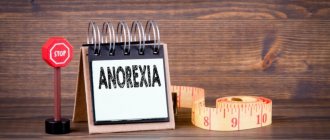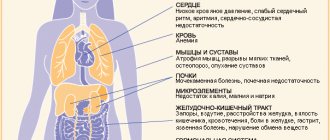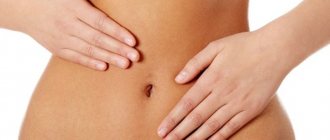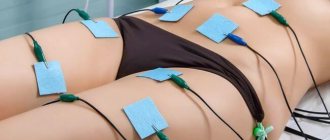General Features
Despite the fact that the disease progresses differently in a newborn and a 10-year-old child, childhood anorexia has a number of common features that are characteristic of any age.
Kinds
- Primary (functional-psychogenic, neurotic)
Occurs against the background of a disrupted diet or stress in the presence of good health.
- Secondary (somatogenic)
Unlike adults, children most often suffer from the somatogenic form. Refusal to eat is caused not simply by reluctance or some kind of internal protest, but by a serious illness. Moreover, this can be either a congenital genetic pathology or an accidentally acquired infection or intoxication. The first thing parents who notice signs of an eating disorder in a child need to do is undergo a medical examination to find out if the child is healthy. As a rule, after a course of treatment of the underlying disease, anorexia also goes away.
Causes
In accordance with the above classification, the causes of childhood anorexia are divided into 2 large groups.
Somatogenic:
- allergy;
- worms;
- respiratory failure;
- diseases of the oral cavity: thrush, stomatitis;
- intoxication;
- any problems with blood circulation;
- adrenal insufficiency;
- otitis;
- pathologies of the digestive system: ulcers, gastritis, intestinal inflammation;
- rhinitis;
- sepsis.
Functional-psychogenic:
- numerous snacks between main meals in the form of sweets dull hunger;
- a monotonous menu reduces the child’s interest in food;
- the lack of a diet leads to the fact that babies do not develop a food reflex, which is formed as a result of feeding by the hour;
- overfeeding;
- severe fear;
- stressful situation.
If a medical examination does not reveal underlying diseases against which anorexia could develop, you will have to make an appointment with a psychotherapist to identify the causes of a psychogenic nature.
Symptoms
Anorexia in a child can be easily “calculated” by two main signs: refusal to eat and weight loss. Along the way, you can observe:
- symptoms of other diseases against which anorexia developed;
- nausea and vomiting at the sight of food;
- irritability, moodiness, worsening mood at the table;
- demonstrative behavior during meals: unnatural laughter, throwing objects (cups and spoons) off the table, incessant talking, etc.;
- poor condition of teeth and oral cavity: caries, stomatitis;
- lethargy;
- sleep disturbance.
It must be borne in mind that a child’s refusal to eat can be a one-time event and last no more than 3-4 days. Therefore, there is no need to immediately panic and diagnose him. Parents should monitor their child’s condition for at least a week in order to draw the right conclusions and seek medical help. This does not apply to situations when a child does not eat anything for several days and suddenly loses weight - this requires immediate consultation with a doctor.
Treatment
Treatment of anorexia involves, first of all, eliminating the factors that provoked its development. Much will depend not so much on the doctors as on the parents. Their task is to create a favorable environment in the family and develop a positive attitude towards food in the child, forming correct eating habits, taking into account previous mistakes that led to such an unfavorable state of affairs.
Home “psychotherapy”
You need to adhere to a strict feeding regimen. Deviations should not be more than half an hour. Do not give your child sweets between meals.
To improve appetite, half an hour before main meals, the baby needs to be provided with peace so that he does not run around, does not play noisy games, but tunes in for the upcoming meal.

A beautifully decorated dish will help arouse your child’s interest in food.
While eating, there should be no distractions: you need to remove goodies from the table, turn off the TV and gadgets, remove toys and books from view.
To arouse a child’s interest in food, decorate the dish beautifully, brightly, and unusually—on the Internet you can find a huge number of ideas on how to do this. And to avoid being intimidated by the portion size, serve the food on a large plate.
If they refuse, children with anorexia should in no case be punished - this aggravates their condition. Just wait patiently for your next meal without raising your voice or reproaching. If you have difficulty swallowing or chewing, you can wash down your food with small sips of water.
Drug treatment
At an advanced stage, parental measures alone are not enough. The patient may be hospitalized and prescribed medication:
- ascorbic acid;
- vitamins;
- iron;
- tincture of wormwood or valerian, mint;
- hydrochloric acid mixed with pepsin;
- enzymes.
Typically, a child’s body copes with illnesses more easily. Anorexia is so insidious that everything here is exactly the opposite: the younger the child is, the more severe it will be.
Treatment of childhood anorexia
At TsIRPP, you can undergo outpatient and inpatient treatment for childhood anorexia, depending on the patient’s health status at the time of contacting the clinic. We offer:
- an individual approach to solving problems with childhood feeding disorders;
- application of methods of treatment and identification of the causes of the disease that are recognized as effective and safe in the world community;
- a better approach through collaboration with the Linehan Institute, an international academy for eating disorders, where our therapists receive additional training and supervision;
- progressive treatment methods that involve the involvement of relatives;
- drawing up an individual menu taking into account food preferences for each patient;
- treatment services in the intensive care unit if the child is in serious condition;
- participation in family intensives, communication with a psychotherapist via Skype to exclude relapses of childhood anorexia.
Anorexia in adolescents and children is often associated with weight loss, so the first goal of treatment is to eliminate symptoms of malnutrition. At this stage, treatment methods such as frequent fractional and parenteral nutrition and maximum rest in bed are used.
When weight gain is noted, you can begin to address the issue of food perception for children. With the help of a psychologist, psychotherapist or psychiatrist, the fight against the psychological manifestations of anorexia begins. To do this, cognitive behavioral therapy is carried out for up to six months, which allows you to change distorted children's ideas about food and get rid of anger and anxiety.
Family therapy plays an important role in treatment. It is important to find problems in the relationship between parents and child that could provoke the disease.
In newborns (up to one year)
The most difficult thing is to determine anorexia in young children, because they can cry and refuse to eat under the influence of a variety of factors.
Causes
Psychogenic:
- insufficient fat content of breast milk;
- unsuitable mixture;
- incorrect introduction of the first complementary foods;
- congenital pathologies.
Somatogenic:
- bilirubin encephalopathy;
- congenital defects of the oral cavity (prognathism, cleft palate, cleft lip);
- hemolytic disease of the newborn;
- developmental defects of the central nervous system;
- hereditary diseases of amino acid metabolism (hypermethioninemia, maple syrup disease, tyrosinemia);
- prematurity;
- general immaturity of the body;
- weakening of sucking and swallowing reflexes;
- birth or traumatic brain injury.
Symptoms
The signs of anorexia are most clearly expressed in children under 1 year of age - they are easy to notice with the naked eye, because newborns cannot hide their aversion to food.
What parents should pay attention to:
- the baby whines, is capricious, fidgets when it’s time to eat - this is how he expresses his displeasure with this process (this anorexia is called dysthymic);
- the regurgitation reflex is triggered in the absence of underlying digestive diseases (the so-called regurgitant anorexia);
- the newborn does not take the breast, turns away;
- greedily grabs the breast or pacifier, but then spits it out and begins to cry.
At the first sign of an eating disorder, you should immediately inform your pediatrician.
Treatment
Infantile anorexia can be treated successfully only in one case - if its cause is precisely established. If it is another disease, it is identified and treated urgently (or at least the symptoms are eliminated and the condition is alleviated if the pathology is chronic or genetic). If this is related to feeding, you will have to change the eating regimen or the food itself (buy a different formula, for example, or start complementary feeding not with rice porridge, but with buckwheat).
Newborn children suffering from anorexia require vigilant parental attention and urgent measures to eliminate its causes. After all, their main task before the age of 1 year is the growth and formation of internal organs and systems, and with such a diagnosis, full development is impossible.
amazing stories of people who were able
Author: May 10, 2021 16:59
Many people think that anorexia is not a disease, you just need to eat more and everything will go back to normal. However, getting rid of this disease is not so easy: it insidiously pulls people into its bony clutches for completely different reasons, most often psychological. Accompanied by metabolic diseases, infections, diseases of the digestive system. The people from our selection were on the verge of life and death, but managed to survive!
Caitlin Davidson managed to recover from her illness and became a fitness model, and she began her journey with 38 kg
Source:
The difference is a year. Interesting work prompted weight restoration
Source:
Brittany Begander is 28 years old. At first she suffered from anorexia. then I gained 80 kg and got into shape!
Source:
Claire Mercer weighed only 25 kg at 19 years old. She's come a long way to feel healthy
Source:
Anorexia affects not only girls, but also guys. In such cases, the only thing that can help is the support of loved ones and faith in yourself!
Source:
Schoolgirl Chiara Schober from Liechtenstein was so worried about the death of her beloved grandmother that she almost completely refused to eat. She lost 22 kg. Then she met Jason, fell in love and started gaining weight
Source:
Victory has not yet been achieved, but the result is obvious
Source:
From anorexic to fitness model
Source:
Megan Jane Crabbie from Essex is 24 years old. From struggling with anorexia, she took the path of body positivity. Now she celebrates all the parts of herself that society teaches us to be ashamed of.
Source:
Indie Rose was 14 when she wanted to become the most beautiful girl in school. When she was hospitalized, she weighed 38 kg. Now she's trying to tell everyone that you don't have to be obsessed with your body.
Source:
Fear of death helped Annabelle No
In children (1-3 years)
1-3 years is a real breakthrough in the development of a child: he learns to walk, talk and live in society. Anorexia at this age is rarely caused by congenital defects, since they are detected mainly in the first year of life. Psychological factors also do not work in most cases, since children do not yet understand the divorce of parents or the death of one of the family members. Here completely different mechanisms come into play.
Causes
The main reason is force-feeding of foods that are healthy from the parents' point of view. A 2-year-old child cannot understand adults’ lectures about the need for food, so forced meals turn into real torture for him, which he wants to avoid by any means. As a result, food causes a negative reflex in him. In advanced situations, vomiting begins from just the sight of soup or porridge.
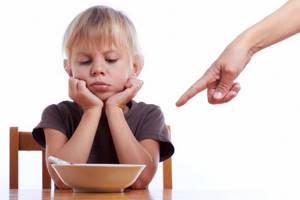
Force-feeding is one of the causes of childhood anorexia
Symptoms
Active refusal to eat: fights, throws everything from the table onto the floor, spits out food, compresses his lips tightly, not allowing himself to be fed.
Passive refusal: does not eat adult food during the transition from breastfeeding to regular feeding, categorically does not accept cereals, vegetables, meat; at the same time, he chooses strange methods of protest - he suddenly begins to eat lemons or takes a mouthful of water.
Treatment
Since in most cases, anorexia in children 1-3 years old is dictated by incorrectly formed eating habits, parents have to work long and painstakingly to correct their own mistakes. You will have to patiently instill them in your baby step by step. Drug treatment is rarely prescribed at this age.
Consequences of anorexia for the body
changes in hormonal levels (the function of the thyroid gland is disrupted, the formation of sex hormones), which leads to menstrual irregularities and osteoporosis (destruction of bone tissue);
the number of heart contractions decreases;
blood pressure decreases;
the electrolyte composition of the blood changes - the potassium content drops, which causes a disturbance in the rhythm of cardiac activity that is life-threatening;
increased serum cholesterol levels;
decrease in the number of leukocytes in the blood;
damage to tooth enamel;
weight loss (up to 40–50%);
disruption of the digestive tract (bloating, constipation);
brittleness of hair and nails;
memory loss, slow thinking;
headaches, dizziness;
For preschoolers (4-7 years old)
Anorexia is often diagnosed in preschool children, since at 5-6 years the psyche is already more or less formed, the child has adapted to society, and begins to understand a lot about relationships between people. And here any stress suffered can cause an eating disorder.
Causes
These could be:
- conflicts with someone from the environment (peer neighbor, brother or sister, stepfather);
- unfavorable family environment;
- visiting a kindergarten where relationships with other children or the teacher do not develop;
- parental divorce;
- severe fright (dog attacked, fell from a height, etc.);
- death of a family member;
- fear of school;
- physical or sexual violence.
Symptoms
Along with refusal to eat and weight loss, preschoolers may experience:
- insomnia;
- hyperexcitability or, conversely, lethargy;
- dizziness;
- isolation, development of acquired autism;
- constipation;
- skin itching;
- urinary incontinence.
Treatment
Treatment is carried out within the framework of psychotherapy. Commonly prescribed pediatric sedatives include:
- soothing pharmaceutical teas: Calm down, Bayu-bai, Evening fairy tale;
- weakly brewed infusions for the night: linden blossom, mint, lemon balm, valerian, lavender, motherwort;
- Persen is a completely herbal preparation;
- Citral is more powerful, contains magnesium sulfate and sodium bromide;
- Glycine;
- Magne B-6 - mineral and vitamin complex;
- potent tranquilizers (Sibazon, Phenazepam, Elenium) are prescribed to correct a clearly defined disorder exclusively by prescription and under the supervision of a physician.

Children suffering from anorexia, first of all, need to feel that they are loved. Usually, family psychotherapy courses are prescribed for treatment, where both parents are invited. The preschooler’s recovery depends only on them.
Signs of developing anorexia
constant preoccupation with one's weight and appearance;
reluctance to eat at a common table;
constant dissatisfaction with the achieved result, although the weight loss was greater than planned;
distorted perception of one’s appearance: even with severe emaciation, the teenager sees himself as fat;
fatigue, irritability;
cessation of menstruation in girls;
alternating periods of aversion to food with bouts of bulimia;
calorie counting, constant weighing;
mirror symptom: constantly looking for figure flaws in front of the mirror.
In the case of bulimia, a person first experiences extreme hunger and cannot stop eating, and then experiences feelings of guilt and self-loathing, causing vomiting.
